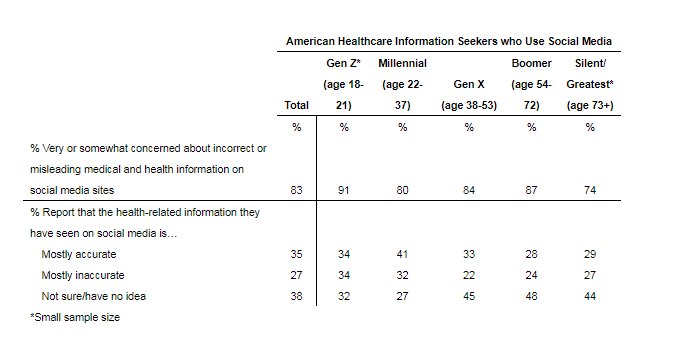A survey profiling how American adults access, use and feel about health-related information finds that most Americans who regularly seek health information are concerned about incorrect or misleading medical information on social media, and few have found health information on social media to be accurate.
These findings are consistent across generations. The survey, The Great American Search for Healthcare Information, was conducted among 1,700 Americans 18 years of age and older. It was commissioned by global communications and marketing services firm Weber Shandwick in partnership with KRC Research.
I find the results of this survey very interesting for a number of reasons.
Firstly, it’s interesting to learn that the majority of online health seekers are concerned about incorrect or misleading medical information. This reassures me in a way because it means that, contrary to the pervasive belief that the public believes everything they read online, people are actually far more discerning.
It also underscores for me that patients aren’t looking to supplant knowledge from healthcare professionals with the information they find online. They still look to their healthcare providers as the source of credible health information.

Note that nurses, pharmacists, and eye doctors score higher than medical doctors in terms of satisfaction. This finding surprised me. The survey suggests that physicians may have a millennial problem.
The Millennial generation is least likely to be very satisfied with the information provided by medical doctors. In evaluating other attitudes toward physicians, the study suggests that doctors may be contending with a Millennial trust challenge. In addition to their lower satisfaction levels with information from doctors (on a basis relative to other generations), Millennials are the least likely generation to say they always listen to their doctor(s), the most likely to believe that online health-related information is as reliable as that from medical professionals and the most likely to say they trust their peers more than medical professionals.

Secondly, I find it disheartening that survey respondents are not finding accurate health information online. We know for a fact that accurate health information does exist online, so why are people not rating it higher? Medical information websites fall just below average in terms of satisfaction (39 percent).
Finally, I’m a little surprised to learn that concerns about the accuracy of social health information are consistent across generations, including digital natives.
Gen Z, is just as likely to be concerned about incorrect or misleading information as the much older Boomer generation (91 percent and 87 percent, respectively). This suggests that social media comfort and proficiency do not have a bearing on perceptions of legitimacy, leading to the conclusion that it is the content or channel that is the challenge for health-related information communicators.
All of this adds up to a trust and credibility problem we need to urgently address.
A Wake-up Call for Healthcare Professionals
The healthcare industry is still lagging behind in delivering credible and relevant information to patients when and where they need it most. Healthcare has much to learn from other industries that are adept at mapping the customer journey and providing relevant and timely information at each stage of the journey.
Earning Trust From Online Health Information Seekers
Within each problem lies its solution. To address the trust gap, the authors suggest the following fixes:
Prove your online credibility from the outset
- information should be cited by a medical professional
- it should cite a scientific study
- it should be associated with a trusted brand
- it should be cited by a trusted school or research organization
Design your content for discovery
By building content that is discoverable across multiple channels – online and offline – you can intersect your customers across their journey and ensure that they find the credible information they’re looking for.
Use succinct, clear and plain language in your communications.
Recognise that people are swimming in information and overwhelmed by the volume, creating confusion and perceptions of conflicting facts.
I would add to this list that it’s important to talk to patients in your offices about the information they find online. For more on this read What’s the Influence of Patients’ Internet Health Information-Seeking Behaviour on the Patient-Physician Relationship?
A Wake-up Call for Healthcare Professionals
In a post published in Physician’s Weekly, primary care physician Mikhail Varshavski, DO, is unequivocal that healthcare professionals’ failure to influence social media is responsible for the rise of misinformation online.
I used to consider the absence of quality physicians online merely a problem of missed opportunity. Now I’ve realized it is much more than that. If misinformation has the power to call in to question the validity of something as grand as an American presidential election, it certainly has the power to influence our patients’ everyday health decisions. The healthcare industry as a whole needs to advocate for more education and focus on this burgeoning global communication platform.
According to a 2017 survey by PM360 Online, only 9% of physicians engage with patients and other health care providers — this includes physicians who reply to comments, join group discussions or share helpful information and links on social media platforms – and as low as 1% of all health care professionals use social media to be content creators — publishing original content via blogs, forums, and websites.
Click here for the full The Great American Search for Healthcare Information report and presentation. It includes additional findings such as the types of health information Americans seek, their use of new digital health services and apps and attitudes about the concerns vs. advantages of the state of healthcare information today.
You might also like to read
Protecting the Value of Medical Science in the Age of Social Media and “Fake News”
An Opportunity To Build Patient Loyalty In An Era Of Social Media And Fake News

One thought on “Do Online Health Seekers Trust Social Media?”